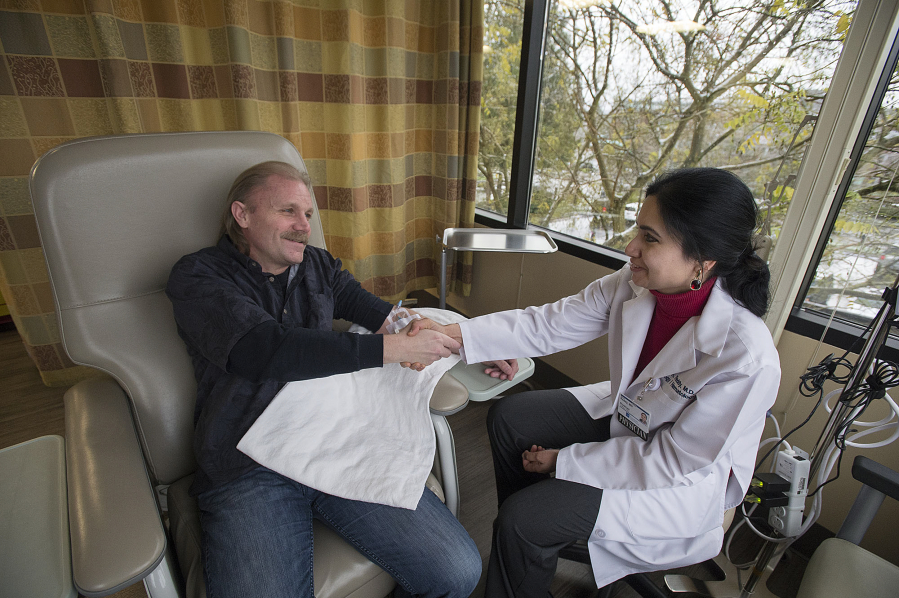Seven years ago, Vancouver resident Lane Mimnaugh’s metastatic melanoma diagnosis would have meant he had just months to live.
Patients typically underwent chemotherapy with side effects that caused their quality of life to decline. They died within six to eight months of the diagnosis, said Dr. Aruna Reddy, an oncologist with PeaceHealth Medical Group.
“Prior to 2011, metastatic melanoma has been a really deadly disease,” she said. “We didn’t have a lot of options.”
But today — more than two years after his diagnosis — Mimnaugh, 49, is alive and doing well on a relatively new drug that uses his own immune system to fight the cancer.
“This can’t be just chance,” Mimnaugh said. “This all lined up at the right time. It’s just amazing to still be around.”
Started with lump
Mimnaugh first noticed a lump on his shoulder about six years ago. At the time, it just seemed like an inflamed mole.
“I just didn’t think it was anything to take care of,” he said.
But a couple of years ago, the lump started getting considerably bigger. Mimnaugh didn’t have health insurance and didn’t want to deal with going to the doctor and incurring a big medical bill.
So, he ignored it.
Mimnaugh ignored the lump until he couldn’t ignore it any longer. Mimnaugh, who worked as a cement mason, asked a physician at a medical office where he had been working to look at his shoulder. The doctor took a quick look and told Mimnaugh to schedule an appointment with his primary care doctor right away.
Mimnaugh knew it couldn’t be good. He made an appointment, then was referred to an oncologist.
“From that moment, my whole life changed,” he said.
Mimnaugh underwent surgery to remove the tumor on his right shoulder. A biopsy confirmed what doctors suspected: Mimnaugh had melanoma that had metastasized into his kidney and lymph nodes.
“Everything passes in front of you,” Mimnaugh said of hearing the diagnosis. “When you get to the end, you start wondering if you’ve done enough,”
“They didn’t know how long I would have,” he said.
Mimnaugh was prepared to begin chemotherapy, but then Reddy told him he was a candidate for immunotherapy.
“That’s when everything changed,” Mimnaugh said. “There is a light. They turned the light on.”
Different approach
Immunotherapy drugs use one’s own body to fight cancer.
The immune system has a way to recognize whether cells are self or invaders and then issues a response to attack foreign cells. Cancer cells, however, mask themselves as normal cells, leaving the immune system incapable of recognizing and attacking invaders, Reddy said.
Immunotherapy drugs essentially remove the mask so the immune system is able to identify and attack the cancer cells, Reddy said. The drugs are different from chemotherapy drugs, which attack all cells, she said.
“It specifically targets the cancer cells,” Reddy said of immunotherapy. “It reactivates the immune system to attack the cancer cells.”
The first immunotherapy drug for melanoma, ipilimumab, was approved in 2011. Initial studies showed about 20 percent of patients undergoing treatment with the drug lived more than two years, Reddy said.
“That was considered a great breakthrough back then,” she said.
Mimnaugh underwent four cycles of treatment on the drug in March 2015, but it wasn’t effective.
“The disease progressed,” Reddy said. “We did four treatments and the scans showed it was getting worse.”
Then, in June 2015, Mimnaugh started on a newly approved immunotherapy drug called Keytruda. He was the first patient at PeaceHealth to undergo treatment with the drug.
Initial studies show patients using Keytruda and another similar drug are showing better results than those on the first drug, Reddy said. As of now, about 40 to 50 percent of patients live more than two years, she said.
Mimnaugh is among those experiencing positive outcomes with the drug. Mimnaugh has been in clinical remission since starting the treatment, and he has only experienced a few minimal side effects.
“That’s a good feeling, knowing there’s something in there on my side,” Mimnaugh said. “Because cancer isn’t on your side. It’s trying to kill you and wreak havoc on your family.”
Every three weeks, Mimnaugh meets with Reddy and has blood work done to ensure his body is still responding to the drug. Then, he undergoes a 30- to 40-minute drug infusion.
Because the drug has only been in use since 2014, there’s no data on how long the drug should be administered. Mimnaugh will continue receiving treatment every three weeks for as long as his body is responding, Reddy said.
There’s also not much data on long-term survival rates of those undergoing treatment on the drug, but Mimnaugh is confident he has many years ahead.
“I can live until I’m 80 or 90,” he said.
“It’s not my day,” Mimnaugh said. “It’s not my time.”





